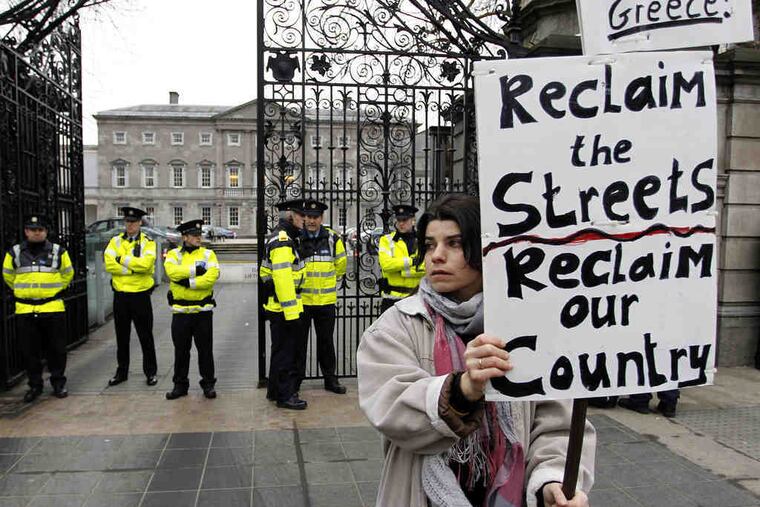
Europe's financial problems reverberated Wednesday through Greece, Ireland, Portugal, and Spain as those nations continued to try to bring their budgets and accumulated debt under control.
Meanwhile, disagreement over how to fight Europe's debt crisis deepened throughout the continent, on the eve of a two-day summit of European leaders as uncertainty fueled investors' concerns worldwide once again.
Following is a look at Wednesday's key developments:
Greece. Protesters fought running battles with riot police in central Athens, torching cars, hurling gasoline bombs, and sending Christmas shoppers fleeing as tens of thousands took to the streets during a general strike against the government's latest austerity measures. Police repeatedly fired tear gas and flash grenades. At least 28 people were injured.
Angry unions held the 24-hour strike to protest new labor rules and pay cuts as Greece struggles to reshape its economy under stringent conditions set by a 110 billion-euro ($146 billion) international bailout. The strike also grounded flights, closed factories and schools, disrupted hospitals, and shut down train, ferry, and bus services across the country.
It was the seventh general strike this year by unions appalled at a wave of austerity policies meant to pull Greece out of its worst financial crisis since World War II.
Wednesday's violence in Athens erupted after tens of thousands of protesters marched to parliament chanting "No sacrifice for the rich!" Walls were daubed with slogans reading "Eat the rich" and "Occupy Athens, London, Rome," in reference to recent violent protests in other European capitals.
Police said 23,000 people took part in the Athens march, and 27,000 marched in other cities.
Late Tuesday, the government won a key vote in parliament on new labor reforms that include deeper pay cuts, salary caps, and involuntary staff transfers at state companies. The new law also reduces unions' collective-bargaining power in the private sector, allowing employers to substantially cut salaries.
Unions said Wednesday's strike aimed to pressure the Socialists into slowing down the spending cuts, which they said were hurting average Greeks.
Ireland. Lawmakers voted to back a 67.5 billion-euro ($90 billion) international rescue for Ireland, designed to keep Europe's debt crisis from getting worse.
Opposition leaders complained fiercely about the high interest rates other European Union partners were demanding from Ireland to help the country cope with its massive bank bailout.
But Prime Minister Brian Cowen argued that Ireland had no choice but to take loans from the European Union and International Monetary Fund at interest rates averaging 5.8 percent because bond investors were demanding "far, far higher rates."
The Irish government plans to plow the first 10 billion euros ($13.3 billion) from the EU-IMF fund straight into the cash reserves of the banks, all of which have been nationalized or partly acquired by the state since 2008, when Ireland's property-weighted economy took a nosedive.
An additional 50 billion euros ($67 billion) from the fund will be gradually tapped to cover government red ink through 2014.
Portugal. The government proposed fiscal measures including placing new limits on compensation payable to workers who lose their jobs and allowing temporary reductions in working hours at companies in difficulty.
The proposals, which seek to facilitate company restructuring, will be presented to trade unions and business leaders for negotiation, Labor Minister Helena Andre said.
Meanwhile, the Finance Ministry will set up teams to monitor whether the government is abiding by its quarterly spending targets as part of the country's effort to reduce its high debt load. Portugal's high debt and low growth have made it one of the frailest members of the 16-nation eurozone.
Spain. Moody's Investors Service threatened to downgrade Spain's debt because, the ratings service said, the recapitalization in 2011 of weak Spanish banks could prove more costly than expected for public finances.
Moody's, which lowered Spain's rating from "Aaa" to "Aa1" in September, said it would review the rating again because of high-financing needs in 2011 but does not expect the country to need a bailout.